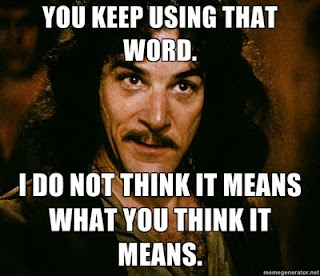Lost in Translation
Over the past 30 years, I’ve have daily interactions with business colleagues across the globe and have had the opportunity to travel to many corners of the world. I seem to have one of those faces that can easily blend in and across a lot of places and cultures. The recent addition of the beard has only added to the repertoire. That’s not always a good thing and can lead to misunderstanding. As a typical American, I stubbornly only speak English. You know how it goes, we Americans believe all that’s required to speak a foreign language is to speak English - only slower and louder. That’s only managed to get me in more trouble in a lot of places. My standard reply - when a shop clerk in Tegucigalpa or a waiter in Agadir start chatting in their native tongue - is to say “sorry” and shrug my shoulders. I guess that’s better than some who would instead glare back at the speaker and simply say “English!”.
I am honestly embarrassed about the Spanish thing. I’ve been traveling throughout Latin America
for more than half my life and live in Florida - where it seems half the
population speaks only Spanish. Eventually I’ll go for one of those week-long immersion
courses in Guatemala, but now I’m basically limited to ordering beers and
asking for directions to the toilet. The
Berlitz tapes only got me as far as “el coche es un Chevrolet.”
Of course, English remains the international business
language. For Americans it easy to get
lulled into the assumption that your English “enabled” foreign colleague is
fluent in the nuances of the language.
English is said to be amongst the more complicated languages to learn,
since there are so many words with multiple meanings. Hell, the following is a grammatically correct
sentence in the English language:
Buffalo buffalo Buffalo buffalo buffalo
buffalo Buffalo buffalo.
You're welcome to Google
it, if you don’t believe me.
Speaking of Google, I’ll have to admit that I’ve made use of
their translation programs more than a few times. They have a mobile app that is supposed to be
able to instantly translate signs or written text from/to dozens of languages
simply by holding your phone up to the text. The program is a bit wonky and the
literal translation of menu items can be downright confusing. A few years ago, I used it in a Shanghai restaurant
specializing in grilled meats and one of the menu items translated as, “carbon
burns black bowel.” I’m still not sure
if that was describing the dish or the aftermath of consuming it? It was a toss up between that or the “chicken
rude and unreasonable.”
I know I’ve had lengthy email communication chains with counterparts
in Peru that made use of Google Translate on both ends. By the sixth or seventh reply to a reply, the
translation starts to resemble that old telephone game – the one where you whisper
a story into the first person’s ear and they do the same down the line. By the time the story reaches the last
person, it’s completely changed. As
complicated as it is for me as an English-speaking American to communicate with
a Spanish speaker, I can only imagine the confusion on both sides, when – as an
example - a native Spanish speaker and a native Korean speaker must negotiate
business in English.
The demand for immediate feedback has pushed most of us from
email to text, WhatsApp, Slack and similar instant messaging apps and programs. That need for instant feedback has further eroded
the cultural mores typically associated with formal business communications. Everything needs to be fast and short. It doesn’t help that we have a president who
prefers to communicate often coarsely and cryptically via Twitter. Like Mr. Trump, I’m a New Yorker by birth. Though I’ve lived in the south for the past
30 years, those New York roots run deep.
Consequently, I’ve never been shy about expressing my opinion. In that
respect, I share a common trait with my Dutch colleagues. They tend to say what they think and have
little concern for bruising egos. For
them, arguing is a sport. They rarely
hold a grudge. In an attempt at getting the
upper hand on a Dutch colleague, I reminded him that we were having our
argument in English – therefore claiming supremacy. He was not impressed.
That bluntness doesn’t always register the same across
cultural lines. The lack of filter can
be jarring to some. Mix that with a lack
of fluency in the language used to communicate that message and there is a
perfect recipe for misunderstanding. Like most discussions with my wife, I am often
finding myself apologizing but unsure exactly what I did or said wrong.
Conversely, I have been involved in transactions that went
sour because one party or the other was unwilling to admit they did not understand
the message or intention of the other.
There may be a fear that admitting a lack of understanding is a show of
weakness. That can be exceptionally
dangerous, when -as an example - a Russian speaking ship’s captain must reply
to questions from a very heavily southern-accented American Coast Guard officer. Things can go sour very quickly – resulting in
delays, fines or detention of a vessel.
Though I’ve read eagerly about the promise of wearable, instantaneous
translation devices coming on the market, I’m not holding my breath. The first generation will likely work no
better than the Google Translate app and a Chinese restaurant menu; perhaps starting
a few fights instead of defusing them. Until
that technology is truly available, we all need to learn to see the world from
the perspective of the person on the other side of the conversation. Endeavor to keep the message as direct and
simple as possible, until you are sure that you and your counterpart are really
understanding each other.


Comments
Post a Comment